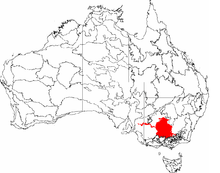Muthi Muthi
| Muthi Muthi | |
|---|---|
 | |
| Hierarchy | |
| Language family: | Pama–Nyungan |
| Language branch: | Kulin |
| Language group: | Western |
| Group dialects: | Madhi Madhi |
| Area | |
| Location: | Northern Riverina and Far West regions of New South Wales |
| Coordinates: | 33°30′S 145°30′E / 33.500°S 145.500°E |
| Rivers | |
| Lakes | |
| Urban areas | |
| Notable individuals | |
The Matimati people, also written Muthimuthi are an Indigenous Australians people whose traditional lands are located in the Northern Riverina and Far West regions of New South Wales.
Name
The Muthi Muthi/Matimati endonym is formed from the doubling of their word for 'speech', namely mut(h)/mut.Most tribes in this area define themselves with a reduplicative form of their respective words for 'no', which in Matimati is yeto.[1]
Language
The last relatively fluent speaker of Maḏi maḏi was Jack Long, a full-blooded nonagenarian Madimadi living at Point Pearce. He was located late in life, in the 1960s, and, a man of outstanding intelligence, he enabled Luise Hercus to record much of what we now know of the language.[2]
Country
Muthi Muthi territory covered an estimated 2,200 square miles (5,700 km2) of land, with a southeastern boundary beneath Balranald to the northern boundaries of the Watiwati, and running north of the Murrumbidgee River. The Nari-Nari lay directly east, the Yitayita were on their northeastern flank, while directly north were the Barindji. On their upper western boundary were the Kureinji, and, further south the Tatitati.[3] Tindale argues that their western boundaries approached the areas of Lake Benanee and at Reedy Lake, and ran from north to west of Carrawathal.[4]
Muthi Muthi lands include the Willandra Lakes Region World Heritage Area, Mungo National Park, Yanga National Park, Booligal National Park, Nimmie Caira and the Lowbidgee Conservation Area.
Society
It has been inferred, by Norman Tindale among others, that the Muthimuthi were close related to their Yitayita tribal neighbours, since their word for 'no', jeto is similar to the Jitajita word.[5] Linguistically they differ, notably in that unlike Yitayita, Maḏi maḏi was completely lacking in monosyllabic words.[6]
Alternative names
- Muti muti, Mutte Mutte
- Matimati, Madi-madi
- Mataua
- Moorta Moorta
- Matthee-matthee
- Bakiin (of tribes to the south, means 'stealthy marauders by night').[5]
Native title
In 1997 a claim for native title was made by Muthi Muthi descendants for an area in the south of New South Wales before the Federal Court of Australia. In Pappin on behalf of the Muthi Muthi People v Attorney-General of New South Wales [2017] FCA 76, the court rejected the claim on the basis of errors in the application, which did not meet the criteria set forth in law.[7][8]
Notable people
- Kutcha Edwards, musician
Alternative names
Some words
- tirili (sky)[9]
Notes
Citations
- ↑ Tindale 1974, pp. 41,197.
- ↑ Evans 2001, p. 262.
- ↑ Hercus 1989, p. 44.
- 1 2 Tindale 1974, p. 197.
- 1 2 Tindale 1974.
- ↑ Hercus 2013, p. 116.
- ↑ AIATSIS 2017, p. 4.
- ↑ AustLII 2017.
- ↑ Hercus 2013.
Sources
- Cameron, A. L. P. (1885). Notes on Some Tribes of New South Wales. Volume 14. Royal Anthropological Institute of Great Britain and Ireland. pp. 344–370. JSTOR 2841627.
- Evans, Nicholas (2001). "The last speaker is dead-long live the last speaker!". In Newman, Paul; Ratliff, Martha. Linguistic Fieldwork. Cambridge University Press. pp. 251–281. ISBN 978-0-521-66937-5.
- Hercus, Luise (1989). "Three Linguistic Studies from Far South-Western NSW" (PDF). Aboriginal History. 13 (1): 45–62.
- Hercus, Luise (2013). Clark, Ian D; Cahir, Fred, eds. The Aboriginal Story of Burke and Wills: Forgotten Narratives. Csiro Publishing. pp. 115–127. ISBN 978-0-643-10810-3.
- Martin, Sarah (May 2010). Archaeological Research, Characterisation and Predictive Modelling Project (PDF). DECCW.
- Pappin on behalf of the Muthi Muthi People v Attorney-General of New South Wales [2017] FCA 76 (9 February 2017), Federal Court (Australia)
- "Pappin on behalf of the Muthi Muthi People v Attorney-General of New South Wales [2017] FCA 76" (PDF). AIATSIS. 9 February 2017.
- Tindale, Norman Barnett (1974). "Muthimuthi (NSW)". Aboriginal Tribes of Australia: Their Terrain, Environmental Controls, Distribution, Limits, and Proper Names. Australian National University Press. ISBN 978-0-708-10741-6.